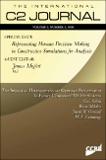The Impact of Heterogeneity on Operator Performance in Future Unmanned Vehicle Systems
Author(s)
Nehme, C. E.; Meckeci, B.; Crandall, J. W.; Cummings, M.L.
DownloadNehme_IC2J.pdf (530.3Kb)
Metadata
Show full item recordAbstract
Recent studies have shown that with appropriate operator decision support
and with sufficient automation, inverting the multiple operators to
single-unmanned vehicle control paradigm is possible. These studies,
however, have generally focused on homogeneous teams of vehicles, and
have not completely addressed either the manifestation of heterogeneity
in vehicle teams, or the effects of heterogeneity on operator capacity.
An important implication of heterogeneity in unmanned vehicle teams
is an increase in the diversity of possible team configurations available
for each operator, as well as an increase in the diversity of possible attention
allocation schemes that can be utilized by operators. To this end, this
paper introduces a discrete event simulation (DES) model as a means to
model a single operator supervising multiple heterogeneous unmanned
vehicles. The DES model can be used to understand the impact of varying
both vehicle team design variables (such as team composition) and
operator design variables (including attention allocation strategies). The
model also highlights the sub-components of operator attention allocation
schemes that can impact overall performance when supervising heterogeneous unmanned vehicle teams. Results from an experimental case study are then used to validate the model, and make predictions about operator performance for various heterogeneous team configurations.
Date issued
2008Citation
Nehme, C. E., Mekdeci, B., Crandall, J. W., Cummings, M. L. The Impact of Heterogeneity on Operator Performance in Future Unmanned Vehicle Systems, The International Command and Control Journal, Vol. 2(2), 2008.
Keywords
heterogeneity, unmanned vehicle, operator capacity, discrete event simulation